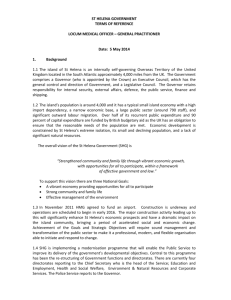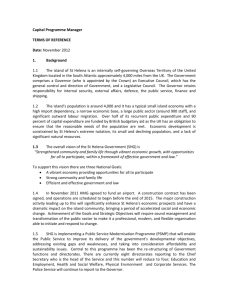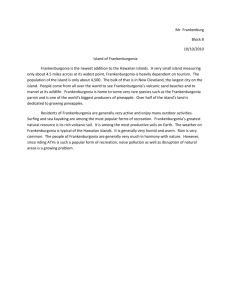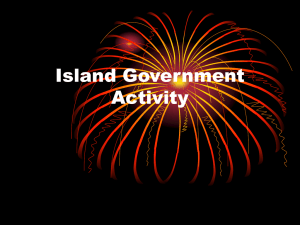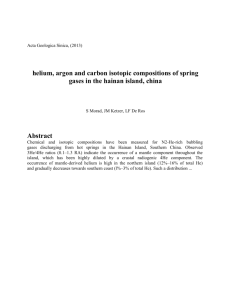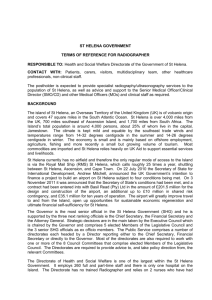ST HELENA GOVERNMENT TERMS OF REFERENCE Oral Maxilla
advertisement
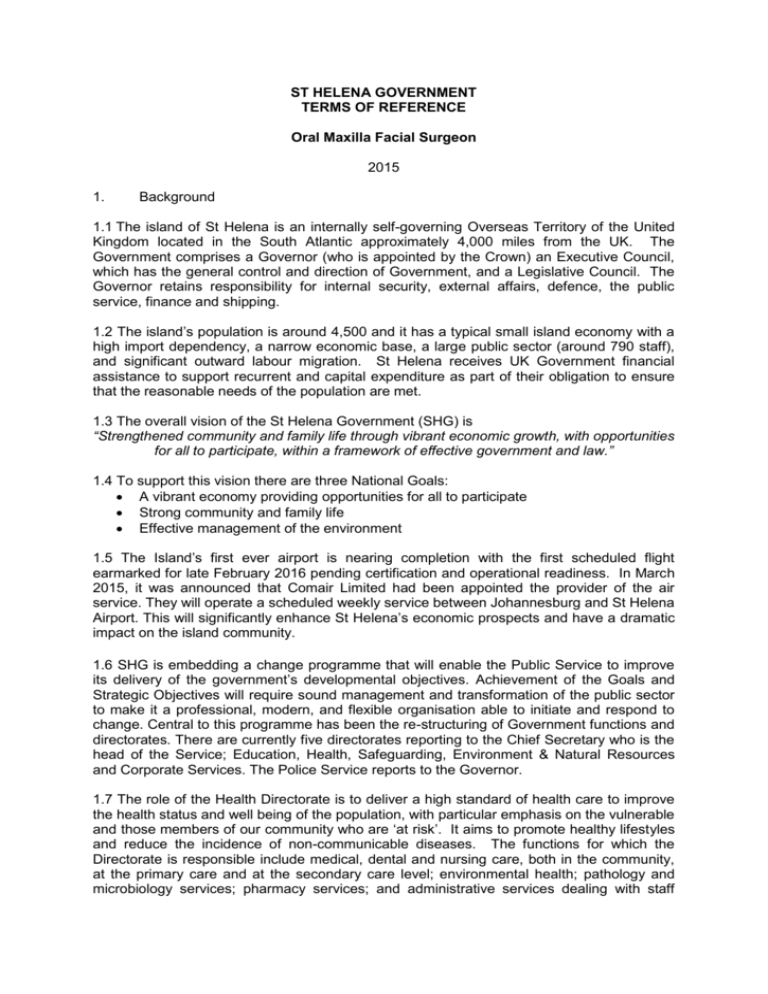
ST HELENA GOVERNMENT TERMS OF REFERENCE Oral Maxilla Facial Surgeon 2015 1. Background 1.1 The island of St Helena is an internally self-governing Overseas Territory of the United Kingdom located in the South Atlantic approximately 4,000 miles from the UK. The Government comprises a Governor (who is appointed by the Crown) an Executive Council, which has the general control and direction of Government, and a Legislative Council. The Governor retains responsibility for internal security, external affairs, defence, the public service, finance and shipping. 1.2 The island’s population is around 4,500 and it has a typical small island economy with a high import dependency, a narrow economic base, a large public sector (around 790 staff), and significant outward labour migration. St Helena receives UK Government financial assistance to support recurrent and capital expenditure as part of their obligation to ensure that the reasonable needs of the population are met. 1.3 The overall vision of the St Helena Government (SHG) is “Strengthened community and family life through vibrant economic growth, with opportunities for all to participate, within a framework of effective government and law.” 1.4 To support this vision there are three National Goals: A vibrant economy providing opportunities for all to participate Strong community and family life Effective management of the environment 1.5 The Island’s first ever airport is nearing completion with the first scheduled flight earmarked for late February 2016 pending certification and operational readiness. In March 2015, it was announced that Comair Limited had been appointed the provider of the air service. They will operate a scheduled weekly service between Johannesburg and St Helena Airport. This will significantly enhance St Helena’s economic prospects and have a dramatic impact on the island community. 1.6 SHG is embedding a change programme that will enable the Public Service to improve its delivery of the government’s developmental objectives. Achievement of the Goals and Strategic Objectives will require sound management and transformation of the public sector to make it a professional, modern, and flexible organisation able to initiate and respond to change. Central to this programme has been the re-structuring of Government functions and directorates. There are currently five directorates reporting to the Chief Secretary who is the head of the Service; Education, Health, Safeguarding, Environment & Natural Resources and Corporate Services. The Police Service reports to the Governor. 1.7 The role of the Health Directorate is to deliver a high standard of health care to improve the health status and well being of the population, with particular emphasis on the vulnerable and those members of our community who are ‘at risk’. It aims to promote healthy lifestyles and reduce the incidence of non-communicable diseases. The functions for which the Directorate is responsible include medical, dental and nursing care, both in the community, at the primary care and at the secondary care level; environmental health; pathology and microbiology services; pharmacy services; and administrative services dealing with staff recruitment, budgeting, procurement, divestment activities and overall support to other sections of the Directorate. 1.8 We deliver the following services: Community Primary Care Services, including Outpatient clinics at 3 areas of the Island and in Jamestown clinic, community nursing services, specialist nurse led clinics for those with long term conditions, mental health services as well as family planning and women and child health clinics Medical and Nursing services, including hospital services such as surgery, acute care, maternity and accident and emergency services Physiotherapy and Occupational Therapy services Dental services Environmental Health services including meat and fish inspections, food hygiene safety, port health, pest control and workplace health and safety Laboratory services including Phlebotomy services, haematology and bio-medical lab services, food and water testing services, pathology testing Pharmacy services in Jamestown and mobile pharmacy services to support outpatient clinics Administration services providing support to all sections of the Directorate, which employs approx. 111 full-time staff 2. Key Objectives The overall essential objectives of the post of are: Be responsible for treating patients requiring oral surgery procedures on the island under L.A. and G.A. for the duration of the contract. He/she will receive the support of various specialist colleagues, dentist, anaesthetist general surgeon and ancillary staff. Supporting colleagues (GPs and specialists alike) whenever needed. The service provided in accordance to best practice in the UK whenever possible. 3. Scope of Work 3.1 The duties of the Maxillofacial Surgeon shall include, but not be limited to, the following: Dentoalveolar Surgery, surgical management of diseases of the teeth and the supporting hard and soft tissues including the removal of dental cysts and impacted teeth. Investigation, treatment and relief of facial pain, which may arise from a variety of structures in the head and neck region. The surgical management of craniomaxillofacial trauma Treatment of Temporomandibular joint (TMJ) disorders The management of oral mucosal disorders such as leukoplakia and recurrent oral ulceration as well as hard and soft tissue diseases of the jaws (oral medicine) Treatment of patients who require hospitalisation for routine dental extractions because of a concomitant medical condition (e.g. haemophilia, severe cardiovascular disorders, unstable insulin dependent diabetes). 3.2 Reviewing/updating and developing relevant protocols and guidelines based on UK NICE or international best practice. 3.3 Providing oral surgical services to all island residents (adult and children) and visitors (in conjunction with other members of the medical team as appropriate), which includes: Safely dispensing & administering medications to patients-complying with St Helena Formulary Ensuring all client/patient contacts are noted on the island’s Electronic patient Management Information System (EMIS) on a daily basis and diagnosis and patient management are clearly recorded 3.4 Undertaking a programme of clinical audit. 3.5 Submitting an end of contract report to the Senior Medical Officer as per agreed format. 3.6 Carrying out other duties as required. 4. Qualifications and experience 4.1 Essential Specialist maxillofacial Surgeon Good command of the English language full G.M.C. registration or equivalence and good standing with that body 4.2 Desirable Overseas experience in a remote location. 5. Competencies Under the SHG Competency framework, the Surgeon is required to have the competencies as outlined in the attached annex. 6. Outputs, Timing and Reporting 6.1 The visit is expected to take place in February 2016 for a period of two weeks. 6.2 The Consultant will report directly to the Senior Medical Officer and will be required to submit an end of contract report. 6.3 The Consultant will require Indemnity cover for his specialist area of work. Annex SHG Competency Framework Levels Professional Development Requirements for Continuous Professional Development met in terms of requisite number of hours/number of development sessions, etc., and when necessary submitted to Professional Institute to maintain professional status. Planning and delivery of work Plans and organises work to meet individual, team and directorate/departmental objectives whilst achieving quality and value for money. Recognises good performance and tackles poor performance. Ensures delivery against plan. Identifies information needs and ensures they are delivered in a timely and effective manner Analysis and use of information Interprets complex written information. Able to assess the validity, relevance and limitations of different sources of evidence. Generates a range of options and appraises them based on evidence available. Decision making Solves problems that have significant short-term implications for the organisation. Assesses the impact of decisions. Identifies causes rather than just symptoms to inform solutions. Uses trends and patterns in information for evidence based decisions. Confident in making decisions within policy guidelines Assembles available knowledge to ensure evidence based decisions. Working with others Informs, consults and influences others using a range of communication mechanisms. Engages with others to gather information Shares and implements good practice with others Works with senior management and other stakeholders Communication Ensures important messages are understood. Ensures written communications are well structured and have clear meaning. Presents information so that it has a positive impact on the recipient. Engages well with others to understand their needs and aspirations. Influencing and persuading Encourages and provides constructive feedback to improve performance. Ensures alternative approaches to work are effective in meeting the organisation and individual needs Remains constructive when disagreeing or challenging. Challenges inappropriate employee behaviours. Dealing with change Supports individuals in their team through periods of change. Listens and responds to constructive feedback. Initiates new ways of doing things. Recognises and deals with obstacles to change. Promotes goals or new initiatives to others. Continuous improvement Makes business and efficiency improvements through use of appropriate systems and tools. Able to coach and develop individuals Shares knowledge and experience with others Manages own development and performance Learns lessons from both successes and failures Managing resources Ensures appropriate resources and levels of capability to deliver to plan Uses management information to monitor/control resources. Supports initiatives for new and more efficient use of resources. Gains respect and credibility from team members through effective delegation, coaching and development.
